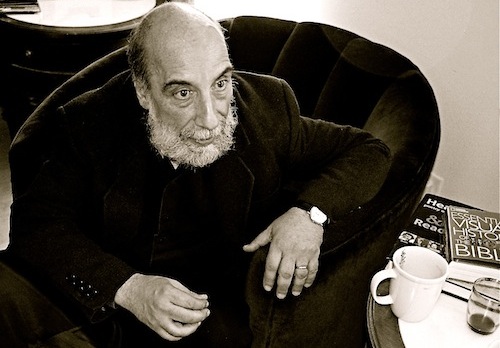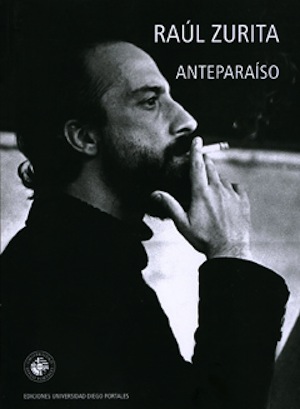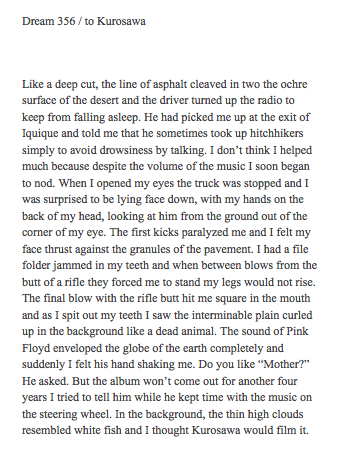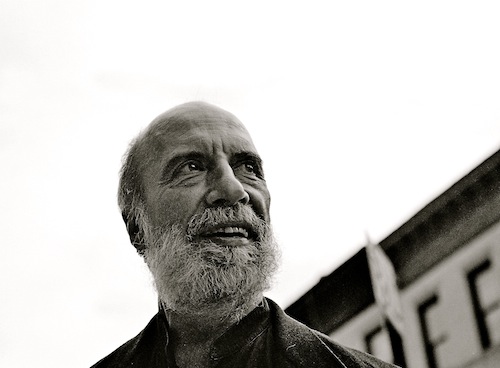From a 'Corrido' to Pink Floyd: Zurita’s 'Kurosawa 356'

Zurita came back from a trip to Vienna, where he read and visited Erick Hackel (the marvelous Viennese novelist who has depicted the violence of Latin American dictatorships like few Latinos have) and since their flight was via New York, we could at least see each other for a couple of hours. I was living in Brooklyn with my daughter, on Franklin Street. It was not a pleasant street but the beloved Chilean poet thought it was magnificent. "This street has a story,” he told me. He had a book for me with him. On the cover was him smoking, very handsome, angry with the world; in short, the same but completely different. The Zurita I knew was thirty years older, did not smoke (a touching transition in which I kept him company) and there was nothing left of the anger in the photograph. But he was the same. I share here that cover photo, like other pictures I took that day, on my street in Brooklyn, outside a tattoo parlor that was next to our door.

Zurita continued his trip to Chile and I was still in New York at a time when he had finished Ciudades de agua (City of Water) and he was immersed in the daunting task of completing the Zurita (that book went through many names, my favorite having been Sky Bellow). He had sent me the poems from that book one by one, granting me the honor of reading them as they came out of his mind, and that honor, along with the letters that accompanied them, has always been what compensated for a collection of bad times in my life.
Making an effort to leave this inevitable sentimentality behind, I’ll move forward towards where I want to arrive. This celebrated book, Zurita, which now has 741 pages and has already appeared in Spain and throughout Latin America, is a book that engulfed his other recent books—just as Zurita engulfed the beautiful smoker he was when he wrote Antiparadise and carries it within him, concealed in his white beard (white like Lorca’s “beautiful nurses and icy streams”). So at that time, when I was reading what was slowly becoming the "Zurita" book, I came across a minor change in a poem that I had already seen in Cities of Water. I was sure that in “Dream 356/to Kurosawa,” the song that plays in the background was a “Corrido” song and not Pink Floyd (in fact, the song played in the early version of the poem was a ranchera, not a Corrido song). Perhaps I (mis)remembered because it is the music of my country and I have always been impressed by how Zurita encouraged me to see the wonderful, twisted sense of humor we have in Mexico (from Rosita Elvirez: from the three shots that hit her, just one was lethal). In the poem a man gets a lift from a truck across one of Zurita’s trademark endless desert plains, the trucker turns up the volume of a song and the “Zurita” of the poem falls asleep. He wakes up beneath the truck surprised to be getting kicked, his face and body getting battered. He grips a folder tightly in his teeth (which in real life had his first poems, when during the coup d'état they imprisoned him, Zurita was an engineering student who flirted with the idea of being a poet, and carried with him a folder of his early poems and drawings of fish). Suddenly he's back in the truck (and one of the marks of his genius is that you never see the seam of this transition). His pain makes of the landscape a hallucination: "a kick hit me full on the mouth, I spat out my teeth and saw the endless plain curling towards the horizon like a dead animal.” At the end of the poem he sees the clouds as white fish and says "I wondered if Kurosawa would film it.”

Our life as if it were someone else's film, and this life in particular, as if sharing some cosmetic ink with the Japanese director's films, moved Zurita to dedicate a series of dreams to him... and to number them with corresponding pages. Until that afternoon in Brooklyn when he visited me in 2009, Zurita's life was given to finishing the book, and his dilemma of the time was that he had to remove the ranchera song (which I misremembered as being a Corrido song) because in the bigger book there was a bomb. Pierced by the intimate and historical, craving the reversibility of the facts, placing all melancholy in wishing the worst things that happened in the twentieth century had not occurred; in his words "that would have been the best poem, that the Palacio de la Moneda had never been bombed, that the bomb had never been dropped on Hiroshima..." So the song that the beaten hitch-hiker (Zurita) now heard would be “Mother” by Pink Floyd... While writing this, Zurita called me from Peru and I took this opportunity to ask him about the change again. I remembered that the song was in the form of a question: Mother do you think they'll drop the bomb? as if it might not happen. A curious fact in talking with him about the reversibility of time is that Zurita (from the poem) tries to tell the driver, "but we’re still four years from the album’s release." It was 1975, the coup was in 1973, and the emergence of the Pink Floyd album that hadn’t yet arrived, was to Zurita "necessary" as a Hegelian matter, as something that time had to bring in order to redeem the unredeemable, or at least the bad times that surround a song like that.
So Zurita continued writing the book that bears his name, writing while listening over and over again to that Pink Floyd album in the background, as if that set the bar higher, as if this song could be the mark in the air where he had to go, and dream those dreams, those poems Kurosawa “would film,” (Kurosawa died in 1998). Thinking now, I see how a poem mirrors the other, the shorter book mirrors the longer one, and that rabid Zurita, angry, beaten, great young poet recognized as a genius since Purgatory came out, but who cannot enter the bookstore in Chile where his book fills the windows because it’s also where he stole the medicine books that he sold to feed his children during the worst years of Pinochet’s dictatorship, mirrors the tranquil man he is now, with his white beard who’s body shakes, but never the mind, and from time to time a rage returns to his gaze, and always, page by page, towards reaching the 741 of his Zurita.

Translated from the Spanish by Torin Jensen
"Dream 356/ to Kurosawa" translated by E.M. Test
Painter and poet Valerie Mejer was born in Mexico City. Her poems explore containment and fragility,...
Read Full Biography

